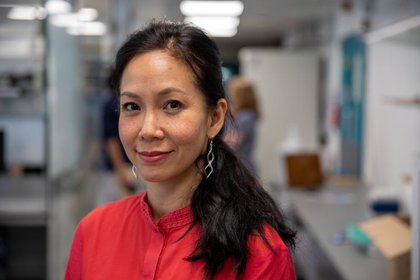The Early Cancer Institute opens today next door to Addenbrooke's, to help create a world where we can detect cancer early enough to cure it.
It is the first institute in the UK dedicated to understanding early cancer and is being run by the University of Cambridge.
Professor Rebecca Fitzgerald, the Institute’s Director, said:
“People have tended to shy away from researching early cancer, but unless we do this work we are not going to improve survival rates for the majority of our patients, because most patients are still diagnosed late."

Outcomes can be completely transformed if the cancer is diagnosed early enough and we have the right treatments
Prof Rebecca Fitzgerald
Prof Fitzgerald added:
“Cambridge has a rich history of making huge strides in cancer research, from developing the technology that allows us to sequence the DNA of tumours through to pioneering new approaches to treatments, such as the use of monoclonal antibodies and PARP inhibitor drugs. We want to build on this legacy of discovery and innovation and apply it to early cancer."

Among the researchers and projects that will use the Institute are:
Professor Serena Nik-Zainal using whole genome sequencing to look for ‘fingerprints’ on the DNA of tumours that give clues to how a cancer arose. She has already carried out significant work on developed tumours and now hopes to apply this to pre-cancer.
Dr James Blundell will look at the ‘fossil records’ in blood samples of patients who went on to develop acute myeloid leukaemia (AML) to try to understand how blood cancers emerge and spread.




Dr Matthew Hoare will try to find out why genetic mutations in chronic liver disease significantly increase the risk of primary liver cancer, one of the only cancers whose rate is increasing in the UK, driven by rising levels of type 2 diabetes and obesity.
Dr Daniel Munoz-Espin is interested in the ‘microenvironment’ around tumours and how we might harness senescence – one of the body’s damage limitation mechanisms – to eliminate tumour cells in lung cancer




The Institute is based in the Hutchinson Building on the Cambridge Biomedical Campus, where its close proximity to a number of world-leading academic, NHS and industrial partners will prove essential to its success.
These include the Cancer Research UK Cambridge Institute, Wellcome-MRC Stem Cell Institute and newly-opened Heart and Lung Research Institute, three hospitals - including Addenbrooke's - and major pharmaceutical companies AstraZeneca and GSK.
At nearby West Cambridge, physicists, engineers and mathematicians will also collaborate with the Institute’s teams.
According to Prof Fitzgerald, this is one of only four life sciences ecosystems in the world – and the largest in Europe – that provide the capability, critical mass, and integration of science and medicine to transform patient care.

A new hospital – the Cambridge Cancer Research Hospital, which should begin construction work next year – is also planned for the campus.
Discoveries and innovations emerging from the Early Cancer Institute will underpin much of the research and treatment that takes place there and beyond and will be complemented by a dedicated space in the hospital.
We’re working to move the world beyond the fear of cancer
Prof Rebecca Fitzgerald

